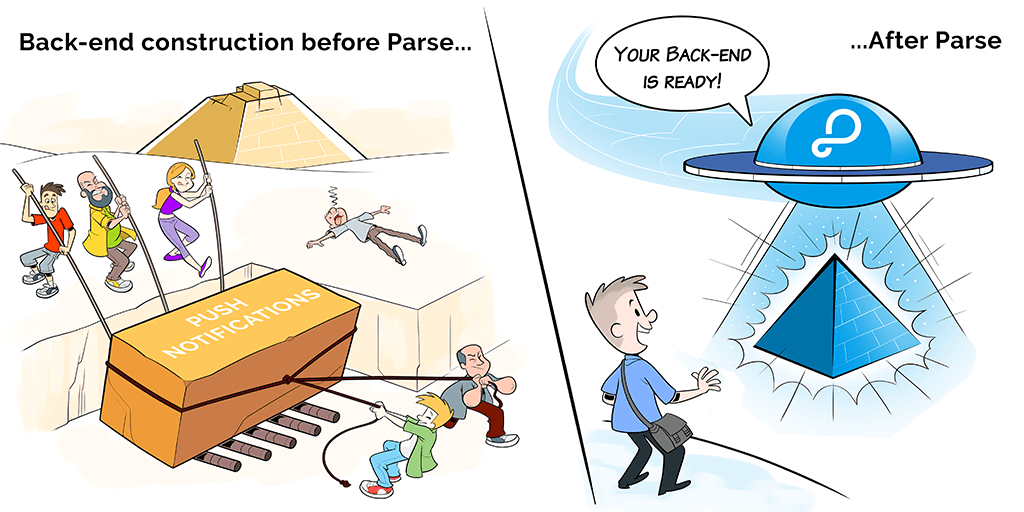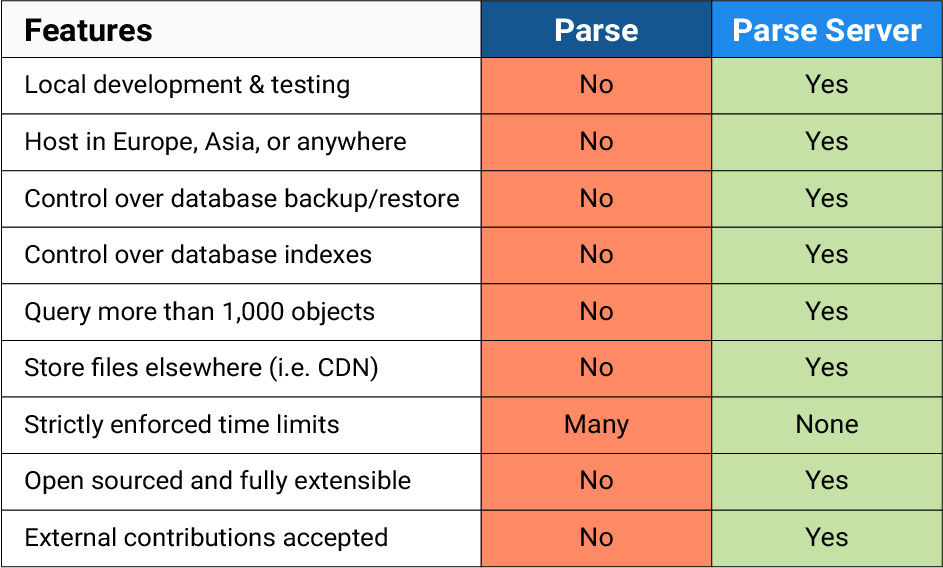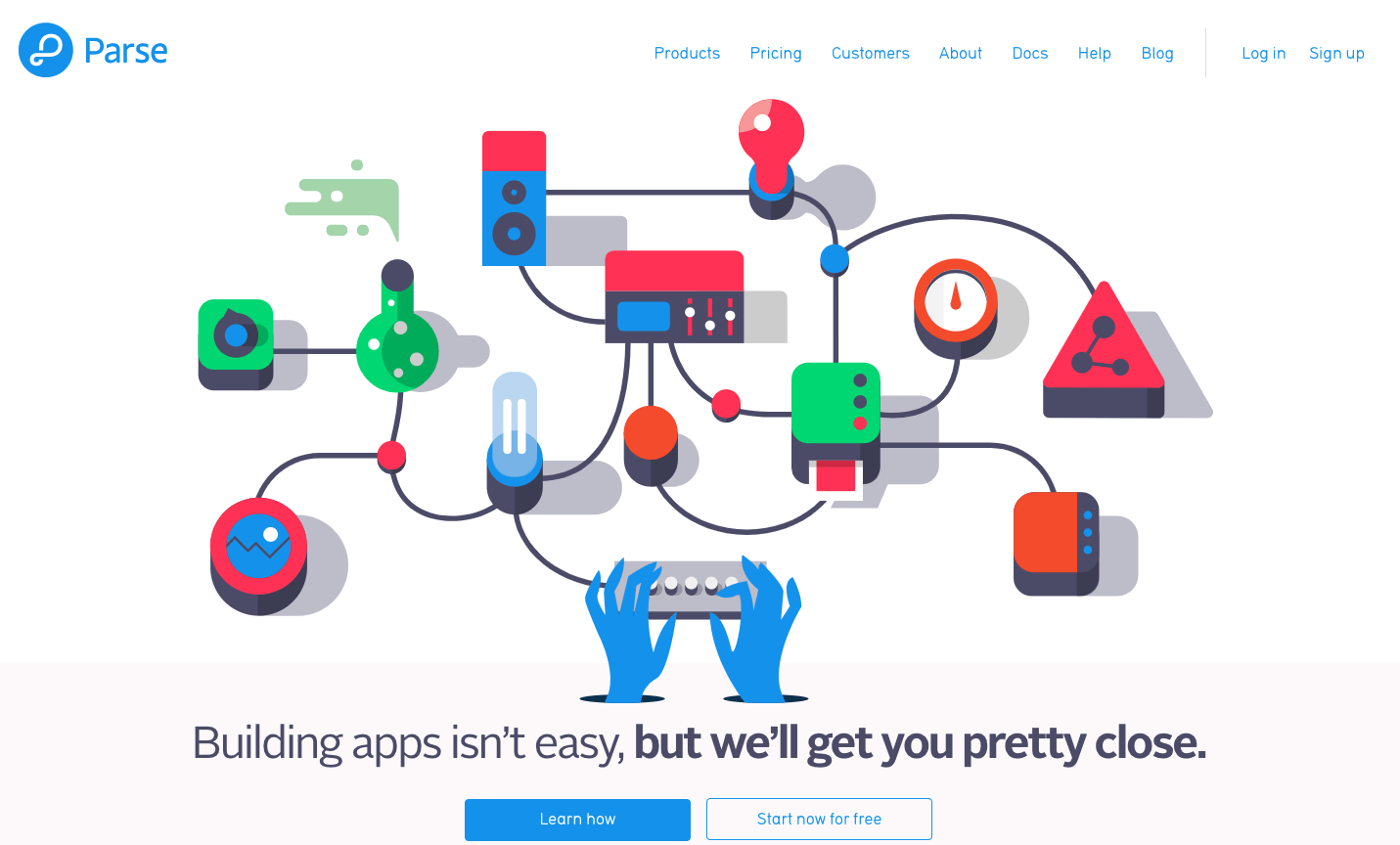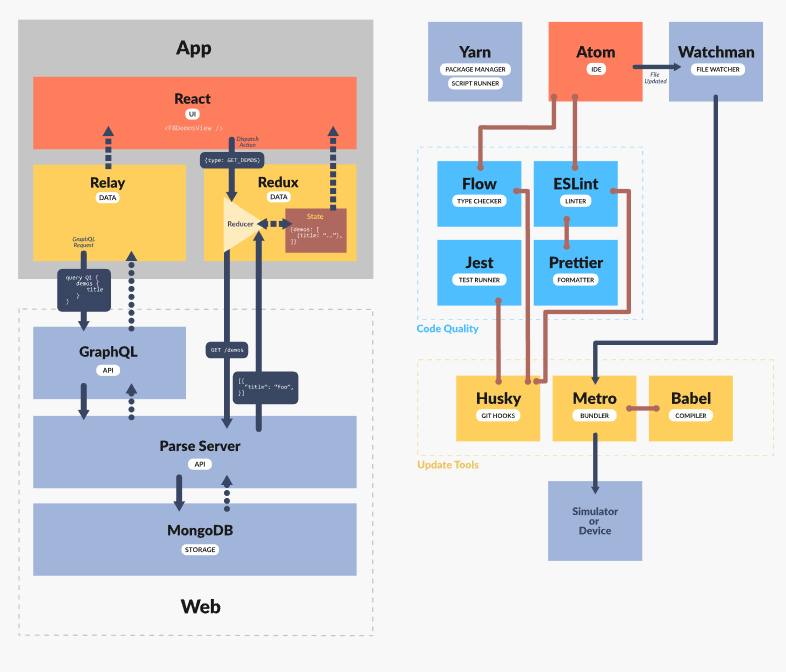The secret of Parse and Facebook
Over the last few years, open source has become the “default” way of building software. Currently, the world of open source is witnessing a plethora of innovations at a considerably high pace. Many of today’s business models are built around free, open source technology. As a result, enterprises are adequately providing support on various open source components and are increasingly shifting their workloads towards open data architecture.
Contents
- 1 History of Parse.com: The Biggest Open Source Community
- 2 Why Open Source Development is the Future of BaaS
- 3 The Promising Facebook Parse Server Stack
- 4 Back4App: Your Best Parse Server Hosting Service
- 5 Conclusion
- 6 General FAQ
- 7 What’s is Parse?
- 8 Is Parse Server Open-Source?
- 9 How to host my Parse app?
History of Parse.com: The Biggest Open Source Community
Parse.com, a Mobile Backend as a Service (MBaaS) that first came into existence in 2011 and grew so quickly that by 2012, it was being used by hundreds of thousands of mobile developers. Later, in 2013, it was acquired by the biggest social media network, i.e. Facebook and went on to power a reported 500,000 applications. It is the most popular BaaS used for building robust mobile apps that work super-quick and provide an exemplary user experience.
Before its inception, developers had to build their own individual backend for all their applications, which was a hefty and time-consuming process and required expertise across various disciplines, including server-side & front-end development, designing, network maintenance, scaling, and more. To be precise, it was way too difficult for a developer to build a product single-handedly. Even though it was still possible to develop a product, dynamic scaling was a huge challenge, which made the development process quite confusing and uninteresting.
And then Parse came into the development province as a blessing for developers, and the rest is history. The sole intention behind launching Parse was to demystify the backend development process. Before long, Parse evolved into a new dimension under the name Parse Server which had more features and improvements in comparison to Parse.
Here’s a chart highlighting the benefits of the most popular backend framework, i.e. Parse Server as compared to its previous version Parse.
Today, Parse isn’t the only contender in the Backend as a Service landscape and the world of cloud. Big companies like Microsoft, Google, and Amazon are consistently coming up with their respective offerings like Azure App Service, Firebase, and AWS Mobile App Backend, and so do companies like Kinvey and PubNub.
But what makes Parse attract more developers and gives it a competitive edge over its fellow rivals is its easy-to-use and well-documented Backend framework, its Dashboard to easily manage your App, the SDK variety, and most importantly, its ability to control everything, including your database, servers, and application layer.
Why Open Source Development is the Future of BaaS
Talking about Parse Server, one of its key highlights is that it is open source. Because of which, it makes thousands of developers happy by allowing them to accelerate backend development with no technical locks. Added to that, it comes with a myriad of features and functionalities. Some of these include push notifications, social integration, data storage, and the ability to add rich custom logic to your app’s backend with Cloud Code.
Today, with Parse Server, you can manage your apps more easily and efficiently, manipulate your data, view analytics, send push notifications, and plenty more – using an all-in-one dashboard. Also, you can have a quick and easy access to all functions of your REST API, without writing a single line of code. Apart from that, it gives you the provision to send automatic verification and welcome emails to your users using your own HTML template. Parse Server provides a specialized user class known as PFUser which automatically handles much of the functionality required for user account management.
In a nutshell, open source development isn’t just growing, it’s actually accelerating exponentially and is undoubtedly the future of mobile app development. The world of open source development is a busy place. Sometimes keeping pace with all of the news, updates, and trends can be difficult. The Parse Blog is active and is regularly updated with fresh content so that you can keep yourself up-to-date on the latest news and announcements about Parse Server and other open source platforms. Also, if you want to donate funds to the repository, there exists a web page that can help you out in case you want to contribute, thus making the whole process easier and effortless.
The Promising Facebook Parse Server Stack
Open-source programming is a process of creating software using the publically available source code. A prominent example of open source software that uses Parse Server as a data backend is Facebook’s F8 app. The sole purpose of the app is to give attendees a schedule for the F8 developer conference (which takes place every year) and provide them a full agenda detailing speakers and descriptions, thus helping them navigate the conference with ease.
Whether you’re at the conference or not, this app empowers you to stay up-to-date on all the latest announcements, personalize and share your bespoke schedule, and browse venue maps to locate sessions. In addition to that, you will be provided with a personalized itinerary to which you can save sessions and share with friends. Plus, the app comprises rich filters, which allow you to quickly find the topics and sessions you’re interested in. Here’s the best part: the app even works offline, as long as you regularly keep it synced to your device.
The app has a React Native UI design framework and is built using a query language GraphQL, which provides a complete and understandable description of the data in your API. One of the key highlights of React Native is its simplicity around developing applications that can run on iOS and Android, without having to repeat most of the app logic in several native languages. Rather than having the “write once, run anywhere” viewpoint, the philosophy of React Native encircles around “learn once, write anywhere”, and that’s what sets it apart from other UI design frameworks.
The moment Facebook released the latest version of F8 earlier this year, the number of views and followers on Parse Server GitHub increased by a hefty margin. The entire source code of the 2017 version of the official F8 app is available on GitHub, which explains how the app is built using React Native, Redux, Relay, GraphQL, and more. Also, there’s a series of tutorials designed to introduce React Native and its Open Source ecosystem, which you can check out here.
Back4App: Your Best Parse Server Hosting Service
Choosing a reliable Parse Server hosting service is of utmost importance in today’s fast-paced development era. This is where Back4App comes into play to save the day, empowering developers to build, host, manage, and scale apps using the open source Parse Server, and that too without boilerplate code and infrastructure hassles. Yes, you heard it right!
Back4App is an open source backend that uses Parse Framework and helps you build scalable and extensive mobile apps at lightning speed, which seemed hard to accomplish before. Back4App has numerous rich functionalities, which include Featured Parse Server, Boosted Server Performance, Easy Deployment, Real-time Database and Analytics, Reasonable Cost, Great Technical Support Team, and more. With world-class and renowned Parse alternatives like Back4App and contributions from code crackers all across the globe, Parse server is bound to be the future of BaaS.
So, what are you waiting for? Keep full control over your backend with Back4App and take your app to a whole new level. Sign up for FREE now!
Conclusion
Parse company started in 2011 and was acquired by Facebook in 2013. After a strategic roadmap change Facebook decided to no longer support hosting services for Parse platform and open-sourced it.
Currently, the platform is supported by a large community of developers around the world and developers are able to self-host their applications or to use Parse hosting services for it.
General FAQ
What’s is Parse?
Parse is a company founded in 2011 and acquired by Facebook in 2013. In 2016 Facebook open-sourced the platform and it’s now supported by a large developer community.
Is Parse Server Open-Source?
Yes! Parse Server is open-source and you can download it here.
How to host my Parse app?
Two options here:
– Self-host your app at AWS, DigitalOcean, Azure, etc
– Parse hosting services like Back4app.







